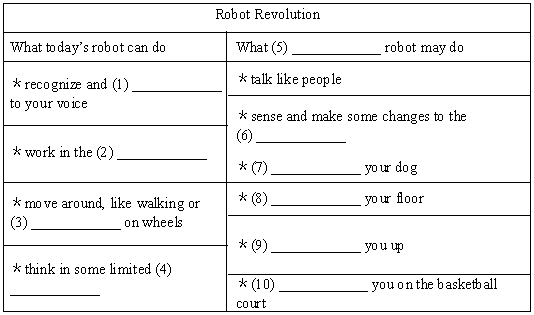阅读理解。
Many people hurt their backs when they try to lift heavy things from the floor. It is easy to hurt your back
muscles when you pick up a heavy object. However, there is a correct way to lift things from the floor. If you
pick up big or heavy objects correctly, you probably will not hurt your back.
To lift something from the floor correctly, first bend your knees and squat (蹲) down. Keep your back
straight. Don't bend over from your waist; keep your back and hips (髋) and waist (腰) in a line. If you bend
over, the muscles in your lower back can become hurt very easily. If you keep your back and hips straight, the
muscles are stronger, because they have much more support. The other muscles can then help the lower back
muscles.
As you squat down, try to get as close to the object as possible. For example, if you are going to pick up a
heavy box, squat down directly in front of it, maybe you will have to spread your knees and legs. Put one knee
on each side of the box. Remember at all times to keep your back straight.
Put your hands under the object that is in front of you, between your knees.
To lift the object, you should stand up slowly. Use your muscles in order to stand up. In other words, lift
with your legs, not with your back.
1. To lift a heavy object mainly depends on _____.
A. legs
B. back
C. knees
D. hands
2. To lift a heavy box, the most important thing you should do is _____.
A. to put your hands under the box
B. to bend your knees and squat down
C. to put one knee on each side of it
D. to straighten your back at all times
3. When you lift a heavy thing, which of the following is wrong?
A. Keeping your back and hips and waist in a line.
B. Putting one knee in front of the thing.
C. Standing up slowly.
D. Putting your hands under the thing between your knees.
4. Choose the correct order in which one lifts a heavy object correctly.
a. Keep your back straight.
b. Bend your knees.
c. Spread your knees and legs.
d. Squat down.
e. Stand up slowly.
A. a, c, b, d, e
B. b, a, c, e, d
C. b, d, a, c, e
D. b, a, d, c, e

